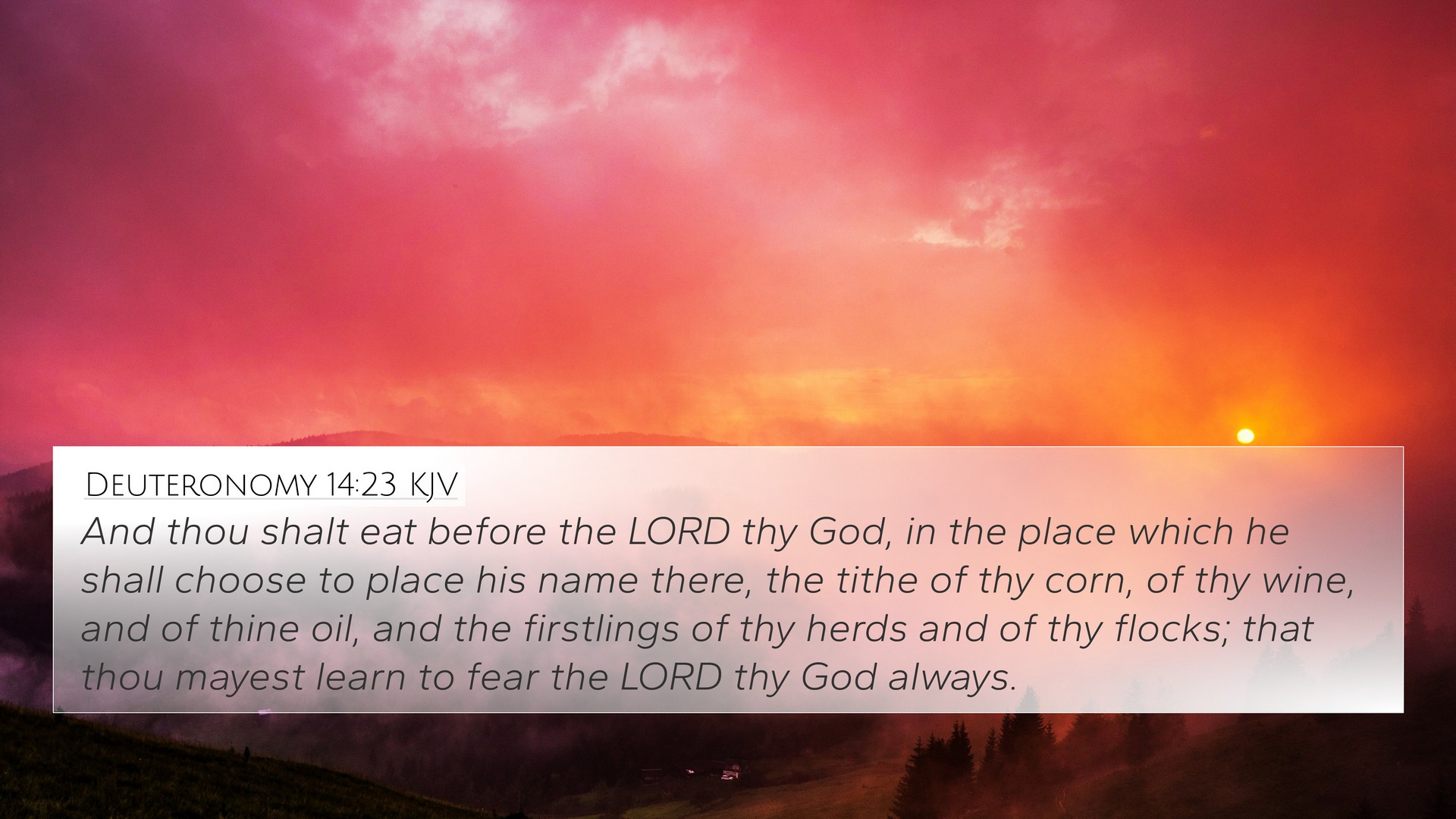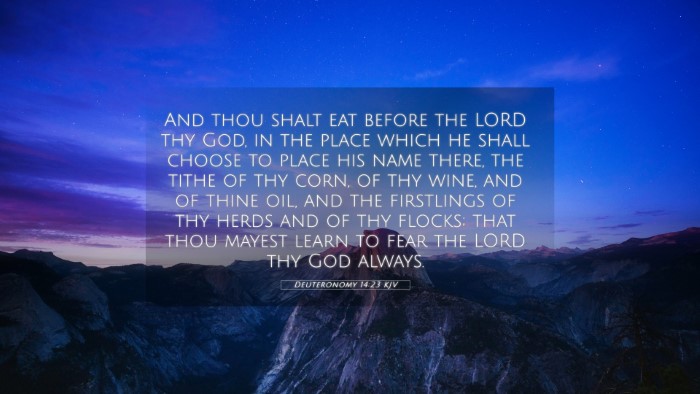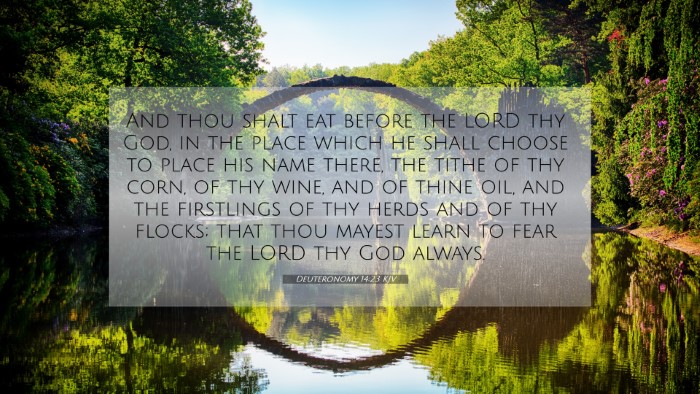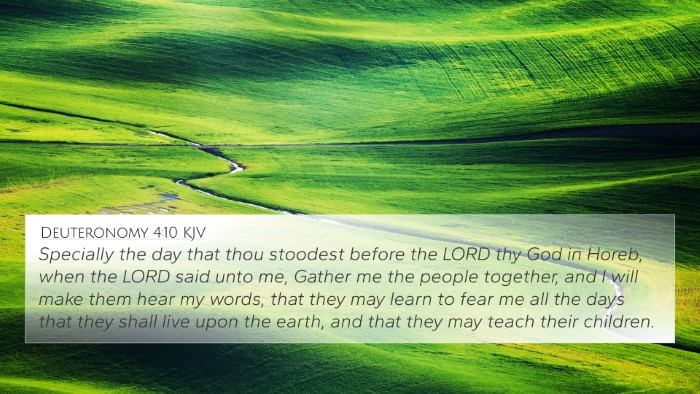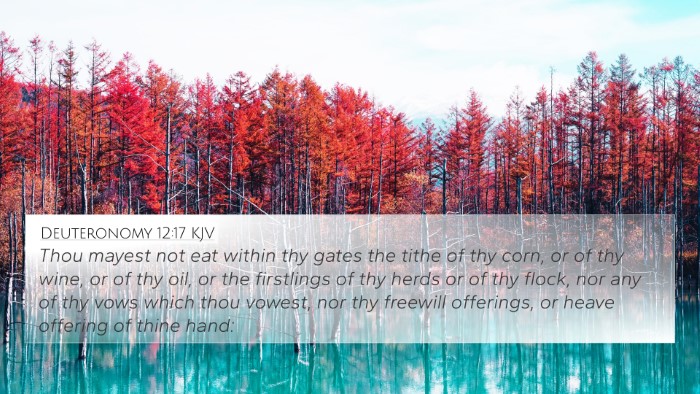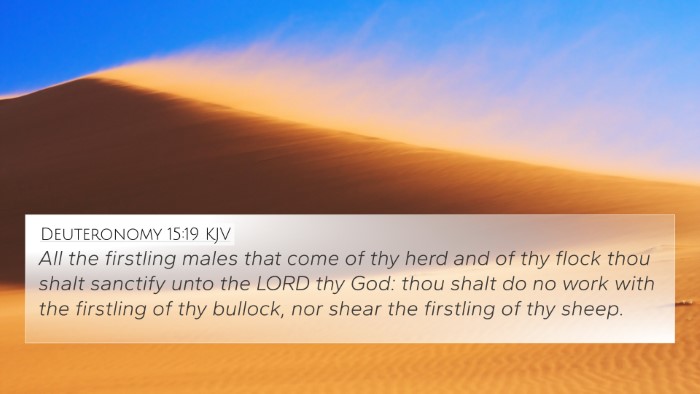Deuteronomy 14:23 states: "And thou shalt eat before the LORD thy God, in the place which he shall choose to place his name there, the tithe of thy corn, of thy wine, and of thy oil, and the firstlings of thy herds and of thy flocks; that thou mayest learn to fear the LORD thy God always."
This verse emphasizes the importance of bringing tithes to the designated place of worship, signifying both obedience to God's commands and the act of worship through the act of giving. It denotes a structured approach to religious practices in ancient Israel and an intention to cultivate a reverent relationship with the Lord.
Meaning and Interpretation
Insights from public domain commentaries provide a comprehensive understanding of this scripture:
- Matthew Henry: Discusses the significance of tithing and eating before God, indicating that it offers a time of spiritual reflection and gratitude. The act of tithing is seen as an acknowledgment of God’s provision in one’s life, fostering a continual sense of reverence and dependence on God’s blessings.
- Albert Barnes: Elaborates on the concept of dedicating a portion of one’s produce and possessions to God, underscoring that it was not merely a duty but an opportunity for fellowship and community worship. Barnes emphasizes the importance of enjoying what is presented to God as a joyful act rather than a burdensome requirement.
- Adam Clarke: Highlights the importance of location in worship, noting that God chose a specific place to establish His name, which later symbolizes the centrality of worship in the life of the Israelites. Clarke also mentions that the first fruits and offerings remind them of God’s presence and influence in their agricultural success.
Spiritual Themes
This verse contains multiple thematic elements:
- Tithing and Offerings: Represents a key aspect of worship and trust in God’s provision.
- Feasting in the Presence of God: Indicates celebration and gratitude, demonstrating deep communal ties and shared experiences among believers.
- Fear of the Lord: Instructs believers on the importance of holding God in reverence and understanding the divine relationship that shapes their lives.
- Divine Selection of Worship Locations: Emphasizes the principle of gathering for worship in places that God designates, promoting unity among believers in their acts of devotion.
Cross-References
Deuteronomy 14:23 is related to several other scripture passages that convey similar themes and principles:
- Leviticus 27:30: Discusses the holiness of tithes and God’s ownership over the harvest of the land.
- Numbers 18:21: Illustrates the provision for the Levites through the tithes of Israel’s agrarian products.
- Malachi 3:10: Encourages bringing the full tithe to the storehouse, assuring blessings from God in return.
- 1 Corinthians 16:2: Paul instructs the believers to set aside contributions, reflecting the continuity of tithing in the New Testament context.
- Hebrews 7:4-6: References the tithe of Abraham to Melchizedek, affirming the enduring principle of tithing among believers.
- Matthew 23:23: Jesus chastises the Pharisees for neglecting justice and mercy while meticulously tithing.
- 2 Corinthians 9:6-7: Encourages generous giving on the part of believers, reflecting the heart attitudes behind the act of giving.
Application of the Verse
Understanding Deuteronomy 14:23 invites believers to reflect on the following:
- Consider how you give and the motivations behind your offerings to God.
- Reflect on the ways in which you can cultivate a spirit of reverence and gratitude in your everyday life.
- Recognize the importance of community and shared worship as vital aspects of a faith-filled life.
Conclusion
In summary, Deuteronomy 14:23 is a multifaceted verse that serves to deepen our understanding of worship, community, and the relationship between God and His people. The commentary insights illuminate the enduring relevance of this scripture as it connects to broader biblical themes and fosters a holistic approach to our lives of faith.
